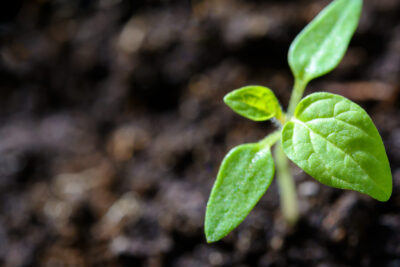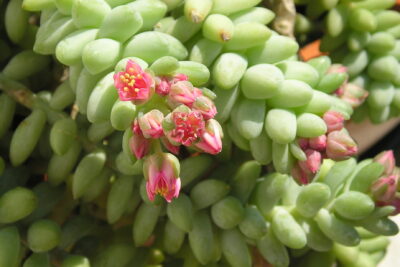
Exploring the Possibility: Can Succulents Really Have Black Flowers?

Succulents have become incredibly popular in recent years, with their unique shapes and vibrant colors adding a touch of natural beauty to any space. While traditionally known for their green or pastel-colored flowers, there has been a growing fascination with the idea of succulents producing black flowers. This intriguing concept has captured the attention of plant enthusiasts and gardeners alike, prompting them to explore the possibility of succulents blooming in this unusual hue.
We will delve into the world of succulents and investigate whether they can truly produce black flowers. We will explore the different factors that contribute to flower coloration in succulents, such as pigmentation and genetics. Additionally, we will take a closer look at some succulent species that are known for their dark-colored flowers and discuss the techniques that gardeners use to enhance or encourage this unique trait. By the end, you will have a better understanding of the potential for succulents to sport black flowers and the methods employed to achieve this striking phenomenon.
- Yes, some succulent varieties do have black flowers
- Black succulent flowers are rare, but they exist
- There are specific succulent species that are known for their black flowers
- It may be possible to find succulents with black flowers at specialty nurseries
- Black succulent flowers can add a unique and striking element to your garden
- The black color of these flowers is caused by pigments called anthocyanins
- Black succulent flowers require specific growing conditions and care
- Some examples of succulents with black flowers include Aeonium arboreum 'Zwartkop' and Echeveria 'Black Prince'
- Black succulent flowers can be a stunning addition to floral arrangements and bouquets
- If you're interested in black succulent flowers, it's worth researching and exploring different varieties
- Frequently Asked Questions
Yes, some succulent varieties do have black flowers
When it comes to succulents, the possibilities seem endless. From their unique shapes to their vibrant colors, these plants have captured the hearts of many gardening enthusiasts. But have you ever heard of succulents with black flowers? Yes, you read that right - black flowers!
While black flowers may seem like something out of a fairytale or a gothic novel, they do exist in the world of succulents. These stunning plants defy the norms of traditional flower colors and add a touch of mystery and elegance to any garden or indoor space.
Which succulent varieties have black flowers?
Among the succulent species, a few stand out for their ability to produce black flowers. One of the most popular black-flowered succulents is the Aeonium arboreum 'Zwartkop'. This striking succulent features rosettes of dark purple to almost black foliage, and when it blooms, it produces small clusters of dark purple or black flowers.
Another succulent variety known for its black flowers is the Echeveria 'Black Prince'. This compact succulent boasts dark, nearly black leaves that contrast beautifully with its bright red flowers. The juxtaposition of the deep black foliage and vibrant blooms creates a captivating visual display.
 Unveiling the Leafy Secrets of Succulents: Exploring Their Diversity
Unveiling the Leafy Secrets of Succulents: Exploring Their DiversityAdditionally, the Sedum 'Black Pearl' is another succulent that deserves mention. With its jet black foliage and contrasting pink flowers, this succulent adds a touch of drama to any garden or arrangement.
Why do succulents have black flowers?
The presence of black flowers in succulents is not due to pigment production like in other flowers. Instead, it is a result of the combination of factors such as the flower's structure and light absorption properties. The dark coloration may help attract pollinators or protect the flower's reproductive organs from excessive sunlight.
It is worth noting that the black color of these flowers might not be as intense as you would imagine. In some cases, the flowers may appear more dark purple or deep burgundy. However, they still retain a captivating allure that sets them apart from other floral hues.
Tips for growing succulents with black flowers
If you're considering adding succulents with black flowers to your collection, here are a few tips to help you grow them successfully:
- Provide adequate sunlight: Most succulents thrive in bright, indirect light. Make sure to place your black-flowered succulents in a location where they can receive ample sunlight.
- Don't overwater: Succulents are known for their ability to store water, so they don't require frequent watering. Overwatering can lead to root rot, which can harm your plants.
- Use well-draining soil: Succulents prefer soil that drains well to prevent waterlogged roots. Consider using a specialized succulent or cacti mix for optimal growth.
- Monitor temperature and humidity: Succulents with black flowers generally prefer warm and dry conditions. Avoid exposing them to extreme cold or high humidity, as it can negatively affect their growth.
With the right care and attention, you can enjoy the beauty of succulents with black flowers in your home or garden. These unique plants are sure to spark conversation and add a touch of intrigue to your plant collection.
Black succulent flowers are rare, but they exist
Black succulent flowers are incredibly rare, but they do exist in nature. These unique and mysterious blooms have captivated the attention of plant enthusiasts and collectors around the world. While most succulents are known for their vibrant and diverse range of colors, the idea of a succulent with black flowers seems almost too surreal to be true.
 Best Low-Light Cactus & Succulents for Indoor Spaces
Best Low-Light Cactus & Succulents for Indoor SpacesHowever, there are a few succulent species that can produce flowers in shades of dark purple, maroon, or deep burgundy that appear black to the naked eye. These flowers are a result of a combination of factors such as pigmentation, light absorption, and genetics.
The allure of black succulent flowers
The allure of black succulent flowers lies in their unique and striking appearance. They add a touch of mystery and elegance to any garden or indoor plant collection. Their dark and velvety petals create a dramatic contrast against the succulent's usually green or gray foliage, making them a focal point and conversation starter.
Black succulent flowers are often associated with symbolism and mysticism. They are believed to represent strength, resilience, and the beauty that can arise from darkness. For some, growing these rare flowers is seen as a symbolic representation of personal growth and transformation.
Succulent species with black flowers
While black succulent flowers are rare, there are a few species that are known to produce these captivating blooms. Here are some examples:
- Echeveria 'Black Prince': This popular succulent cultivar features rosettes of deep purple leaves and produces dark red flowers that appear almost black.
- Aeonium arboreum 'Zwartkop': Also known as 'Black Rose' or 'Black Tree Aeonium,' this succulent has striking, dark purple foliage and produces clusters of small, yellow flowers.
- Haworthia 'Big Band': This unique succulent variety has thick, dark green leaves with white stripes and blooms with tiny, dark purple flowers.
It's important to note that the intensity and shade of the black color may vary depending on factors such as light exposure, growing conditions, and individual plant genetics. Some flowers may appear closer to dark purple or maroon, while others may exhibit a true black hue.
Cultivating black succulent flowers
While it may be challenging to find succulents with true black flowers, you can increase your chances of successfully cultivating these rare blooms by providing optimal growing conditions. Here are a few tips:
- Light exposure: Succulents with black flowers usually require bright, indirect light to develop their dark pigmentation. Avoid exposing them to intense, direct sunlight, as this can cause sunburn and damage the delicate flowers.
- Temperature and humidity: Most succulents prefer warm and dry conditions. Ensure they are placed in an environment with temperatures between 60-80°F (15-27°C) and low humidity levels.
- Well-draining soil: Use a well-draining soil mix specifically formulated for succulents. This helps prevent waterlogged roots and promotes healthy growth.
- Watering: Succulents are adapted to survive in arid environments and are prone to root rot if overwatered. Allow the soil to dry out completely between waterings and avoid excessive moisture.
- Patience: Growing succulents can be a slow process, and it may take time for the plants to produce flowers. Be patient and provide consistent care to encourage blooming.
Remember, black succulent flowers are a rarity, and their availability may vary depending on your location and local nurseries. However, with the right care and conditions, you may be fortunate enough to witness the mesmerizing beauty of these dark and elusive blooms in your own succulent collection.
 Exploring Succulents: Discovering Flower-Like Varieties
Exploring Succulents: Discovering Flower-Like VarietiesThere are specific succulent species that are known for their black flowers
When it comes to succulents, we often think of vibrant greens, blues, and pinks. However, did you know that there are specific succulent species that are known for their black flowers?
Contrary to popular belief, these stunning succulents do exist and can add a unique and mysterious touch to any garden or indoor space. While black flowers are rare in the plant kingdom, certain succulent varieties have evolved to produce these dark and captivating blooms.
One such succulent species is the Echeveria 'Black Prince'. This striking succulent features deep purple to almost black rosettes, which are adorned with small, delicate black flowers. The contrast between the dark foliage and the black blooms creates a mesmerizing visual effect that is truly one-of-a-kind.
Another succulent species that showcases black flowers is the Aeonium 'Zwartkop'. This dramatic succulent boasts rosettes of dark purple leaves that almost appear black in certain lighting conditions. During the flowering season, it produces tall stalks adorned with clusters of small, black flowers that add a touch of elegance to its overall appearance.
What causes succulents to have black flowers?
The dark hue of these succulent flowers is a result of the pigments present in their petals. Just like other plants, succulents contain pigments called anthocyanins, which are responsible for the red, purple, and blue colors we commonly associate with flowers. However, in the case of black flowers, these pigments are present in such high concentrations that they absorb almost all visible light, giving the flowers their distinct black appearance.
In addition to the high concentration of anthocyanins, the intricate genetics of these succulent species also play a role in the development of black flowers. The combination of specific genes and environmental factors contribute to the production of these unique blooms.
Caring for succulents with black flowers
While succulents with black flowers may seem delicate and exotic, they require similar care to other succulent varieties. Here are some tips to help you keep your black-flowered succulents thriving:
A Guide to the Most Common Types of Succulents and Care Tips- Provide ample sunlight: Succulents thrive in bright, indirect sunlight. Place your black-flowered succulents in a location where they can receive at least six hours of sunlight each day.
- Water sparingly: Succulents are known for their ability to store water in their leaves, so they are highly adapted to survive in arid conditions. Water your black-flowered succulents only when the soil is completely dry.
- Use well-draining soil: Succulents prefer soil that is well-draining to prevent root rot. Opt for a succulent-specific soil mix or add perlite or sand to regular potting soil to improve drainage.
By following these care tips and providing the right conditions, you can enjoy the captivating beauty of succulents with black flowers in your own garden or indoor space.
It may be possible to find succulents with black flowers at specialty nurseries
Many garden enthusiasts are constantly on the lookout for unique and exotic plants to add to their collections. One such curiosity is the possibility of finding succulents with black flowers. While the idea of black flowers may initially seem like something out of a fairy tale, it may actually be possible to find succulents with these dark and mysterious blooms at specialty nurseries.
Black flowers in succulents are quite rare and are considered a highly sought-after feature among plant enthusiasts. These flowers, with their deep, dark hues, can add a touch of elegance and intrigue to any garden or indoor space. However, it's important to note that not all succulents can produce black flowers, as this characteristic is specific to certain species.
Types of Succulents with Black Flowers
1. Echeveria 'Black Prince': This popular succulent variety is known for its stunning rosette-shaped leaves that range from deep green to almost black. When in bloom, 'Black Prince' produces gorgeous flowers in shades of dark red or burgundy, resembling the color of blackened roses.
2. Aeonium arboreum 'Zwartkop': Also referred to as 'Black Rose', this succulent boasts dark, almost black, foliage that forms a striking contrast against its bright yellow flowers. The combination of the blackish leaves and vibrant blooms creates a visually captivating display.
 Dormant Succulents: Which Varieties Hibernate in Winter?
Dormant Succulents: Which Varieties Hibernate in Winter?3. Haworthia 'Black Diamond': This Haworthia variety is known for its distinctive, dark green to blackish leaves that have a glossy appearance. While it may not produce flowers as frequently as other succulents, when it does, the blooms are small and white, contrasting beautifully against the dark foliage.
Availability and Care
While these succulents with black flowers are undoubtedly captivating, they may not always be readily available at your local garden center. Specialty nurseries or online retailers that focus on rare and unique plant varieties are often the best places to find these gems.
When it comes to caring for succulents with black flowers, it's important to provide them with the right growing conditions. Most succulents prefer bright, indirect light and well-draining soil. Regular watering, allowing the soil to dry out between waterings, is crucial to prevent root rot. Additionally, providing sufficient airflow and avoiding overwatering can help maintain the health and vibrancy of the plants.
The possibility of finding succulents with black flowers is not merely a myth. With a bit of research and exploration, plant enthusiasts may be able to track down these unique and stunning specimens. So, if you're looking to add a touch of mystery and elegance to your garden or indoor space, consider adding succulents with black flowers to your collection.
Black succulent flowers can add a unique and striking element to your garden
If you're looking to add a touch of drama to your garden, black succulent flowers may be just what you need. These unique and eye-catching blooms are a rare and sought-after phenomenon in the plant world. While succulents are typically known for their vibrant and varied hues, the concept of black flowers may seem like something out of a fairy tale.
 Diverse Native Succulents of Southern California
Diverse Native Succulents of Southern CaliforniaThe Mystery of Black Flowers
Black flowers are an intriguing botanical anomaly. In nature, true black pigments are extremely rare, and most flowers that appear black are actually deep shades of purple, burgundy, or maroon. However, there are a few succulent species that possess flowers that come remarkably close to being truly black.
The Allure of Black Succulent Flowers
Black succulent flowers have an undeniable allure. Their dark, velvety petals create a striking contrast against the fleshy green leaves of succulent plants. They can add a sense of mystery and elegance to any garden or floral arrangement, making them a favorite among avid gardeners and plant enthusiasts.
Types of Succulents with Black Flowers
While black flowers are not common among succulents, there are a few noteworthy species that are known to produce these dark blooms:
- Echeveria 'Black Prince': This popular succulent features rosettes of deep burgundy leaves and produces stunning dark red flowers that appear almost black.
- Aeonium 'Zwartkop': Also known as "Black Rose," this succulent has striking rosettes of deep purple leaves and produces cone-shaped clusters of dark red or purple flowers.
- Kalanchoe 'Black Velvet': This succulent has thick, velvety leaves that are a deep shade of greenish-black. It produces small clusters of tubular, dark red flowers.
Cultivating Black Succulent Flowers
 Discover the Diverse Range of Shapes and Colors in Succulent Varieties
Discover the Diverse Range of Shapes and Colors in Succulent VarietiesGrowing succulents with black flowers can be a rewarding challenge. These plants require well-draining soil, ample sunlight, and careful watering to thrive. It's important to provide them with the right conditions to ensure the development of their unique blooms. While black flowers may not be as common as other colors, their striking beauty makes them worth the effort for any succulent enthusiast.
So, if you're up for the challenge and want to add a touch of intrigue to your garden, consider exploring the possibility of growing succulents with black flowers. These captivating blooms are sure to make a bold statement and leave your garden visitors in awe.
The black color of these flowers is caused by pigments called anthocyanins
Anthocyanins are a group of pigments that are responsible for the vibrant colors seen in various plants, including succulents. While most succulents are known for their green, blue, or purple hues, there are some rare varieties that can produce flowers with a dark and striking black color. This phenomenon has sparked the curiosity of many plant enthusiasts and has led to the question: Can succulents really have black flowers?
The answer is yes! Succulents can indeed produce black flowers, thanks to the presence of anthocyanins. These pigments are responsible for the red, purple, and blue colors seen in many plants, but under certain conditions, they can also create a deep black hue.
It's important to note that not all succulents have the genetic ability to produce black flowers. This unique trait is found in a select few species and cultivars. Some examples of succulents known to produce black flowers include Echeveria 'Black Prince', Aeonium 'Zwartkop', and Sempervivum 'Black'.
Factors influencing the black color in succulent flowers
Several factors play a role in determining whether a succulent will produce black flowers. These factors include:
- Genetics: As mentioned earlier, not all succulents possess the genetic makeup necessary to produce black flowers. It is a rare trait that is specific to certain species and cultivars.
- Light exposure: The amount and quality of light a succulent receives can influence the intensity of color in its flowers. In some cases, increased exposure to direct sunlight can enhance the development of deep black pigmentation.
- Environmental conditions: Factors such as temperature, humidity, and soil composition can also impact the coloration of succulent flowers. Optimal growing conditions that mimic the plant's natural habitat can encourage the production of black flowers.
It's important to note that the black color in succulent flowers is not permanent. As the flowers age, they may gradually fade to a dark purple or brown shade. However, during their peak bloom, black succulent flowers can create a stunning and unique focal point in any garden or indoor plant collection.
 Vibrant Green and Red Succulents: Perfect for Your Garden
Vibrant Green and Red Succulents: Perfect for Your GardenIf you're considering adding succulents with black flowers to your collection, make sure to provide them with the right conditions and care. With proper attention and a little bit of luck, you may be able to witness the extraordinary beauty of these rare and captivating plants.
Black succulent flowers require specific growing conditions and care
Black succulent flowers are a rare and intriguing phenomenon. While most succulents are known for their vibrant and eye-catching colors, the idea of a succulent with black flowers can seem almost otherworldly. However, it is indeed possible for succulents to produce black flowers, but it requires specific growing conditions and proper care.
1. Light: The first key factor in encouraging succulents to develop black flowers is providing them with the right amount of light. Succulents generally thrive in bright indirect light, but for black flower production, they need to be exposed to more direct sunlight. Placing them in a sunny spot, such as a south-facing window, will help stimulate the production of darker pigments in the flowers.
2. Temperature: Succulents are adapted to survive in arid and dry environments, so they tend to prefer warm temperatures. However, to induce the development of black flowers, it is essential to subject them to slightly cooler temperatures. This can be achieved by keeping them in a room with a temperature range of 60-70°F (15-21°C) during the day and slightly cooler at night.
3. Watering: Succulents are known for their ability to store water in their leaves, allowing them to withstand long periods of drought. When it comes to encouraging black flower growth, it is crucial to strike a balance between providing enough water to keep the plant healthy and avoiding overwatering. Too much moisture can lead to root rot and hinder flower development.
4. Soil: Succulents thrive in well-draining soil that allows excess water to escape quickly. Using a specialized succulent or cactus potting mix will ensure the proper drainage and aeration necessary for healthy growth. Additionally, adding a layer of gravel or small rocks at the bottom of the pot can help prevent waterlogged roots.
 Cascading Succulents: A Guide to Long and Trailing Varieties
Cascading Succulents: A Guide to Long and Trailing Varieties5. Fertilization: While succulents generally require minimal fertilization, providing them with a balanced and diluted succulent fertilizer during their active growing season can boost flower production. Look for a fertilizer with a higher phosphorus content, as this nutrient promotes flower development.
It is important to note that not all succulents have the genetic predisposition to produce black flowers. Some varieties, such as the Aeonium arboreum 'Zwartkop' or Echeveria 'Black Prince', are more likely to exhibit this unique trait. However, even with the right conditions, the intensity of the black coloration may vary from plant to plant.
While the concept of succulents with black flowers may seem like a fantasy, it is indeed a possibility. By providing the right growing conditions, including ample sunlight, slightly cooler temperatures, proper watering, well-draining soil, and appropriate fertilization, you can increase the likelihood of your succulents producing striking black flowers.
Some examples of succulents with black flowers include Aeonium arboreum 'Zwartkop' and Echeveria 'Black Prince'
When it comes to succulents, we often think of vibrant greens, pinks, and purples. But did you know that there are succulents with black flowers? It may sound too good to be true, but it's not! Let's explore some examples of succulents that have black flowers.
Aeonium arboreum 'Zwartkop'
One of the most popular succulents with black flowers is the Aeonium arboreum 'Zwartkop'. This stunning plant features rosettes of dark purple to almost black leaves, which contrast beautifully with the clusters of yellow flowers that emerge in late spring. 'Zwartkop' is an easy-to-grow succulent that can add a touch of drama to any garden or indoor space.
Echeveria 'Black Prince'
Another striking succulent with black flowers is the Echeveria 'Black Prince'. This variety boasts rosettes of dark, almost black leaves that take on a velvety texture. In the summer, it produces long, arching stems adorned with bright red flowers. The combination of black leaves and vibrant red blooms creates a stunning visual contrast that is sure to captivate any succulent enthusiast.
While succulents with black flowers may not be as common as those with other colors, they are definitely worth considering if you want to add a unique and eye-catching element to your succulent collection or garden.
 Discover the Most Vibrant and Unique Tri Color Succulent Varieties
Discover the Most Vibrant and Unique Tri Color Succulent VarietiesWhen growing succulents with black flowers, it's important to provide them with the right care. These plants thrive in well-draining soil and require bright, indirect light. Avoid overwatering, as succulents are adapted to survive in dry conditions. Instead, water them sparingly and allow the soil to dry out between waterings.
So, if you're looking to push the boundaries of traditional succulent colors and want to add a touch of mystery to your garden, consider incorporating succulents with black flowers. They are sure to make a bold statement and add a unique flair to your succulent collection.
Black succulent flowers can be a stunning addition to floral arrangements and bouquets
What makes black succulent flowers so unique?
When you think of flowers, vibrant colors like red, yellow, and pink may come to mind. But have you ever considered the possibility of black flowers? While black is not a common color in the plant kingdom, there are certain succulent varieties that can produce stunning black blooms. These dark and mysterious flowers are highly sought after by enthusiasts and floral designers alike.
The allure of black succulent flowers
The appeal of black succulent flowers lies in their rarity and striking appearance. The deep, velvety black petals create a dramatic contrast against the plant's green foliage, making them a captivating focal point in any garden or floral arrangement.
Do black succulent flowers really exist?
Yes, black succulent flowers do exist, but they are quite rare. Most succulents produce flowers in shades of white, pink, orange, or purple. However, there are a few exceptional succulent species that can produce black flowers under certain conditions.
Examples of succulents with black flowers
Here are some notable succulent varieties that are known to produce black flowers:
- Echeveria 'Black Prince': This popular succulent features deep burgundy leaves and produces stunning dark red to black flowers.
- Aeonium 'Zwartkop': Also known as 'Black Rose' or 'Blackhead', this succulent has rosettes of dark purple to almost black leaves and can produce yellow flowers.
- Sempervivum 'Black': This hardy succulent forms rosettes of dark green to black leaves and can produce pink or white flowers.
Cultivating black succulent flowers
While black succulent flowers are a rare find, it is possible to cultivate them under the right conditions. These succulents thrive in well-draining soil, bright but indirect sunlight, and moderate watering. It's important to provide them with the ideal growing environment to encourage the development of their unique black blooms.
In conclusion
Black succulent flowers may be a rarity, but they are a fascinating possibility in the world of plants. Their dark and captivating allure adds a touch of mystery and elegance to any garden or floral arrangement. If you're looking to create a truly unique and eye-catching display, consider adding succulents with black flowers to your collection.
If you're interested in black succulent flowers, it's worth researching and exploring different varieties
When it comes to succulents, we often think of vibrant greens, pinks, and purples. However, did you know that there are succulents that can produce black flowers? Yes, you heard it right! These unique and mesmerizing plants have the ability to bloom in the darkest of shades, adding a touch of mystery and elegance to any garden or indoor space.
While black succulent flowers may seem like a rarity, they do exist. Although not all succulent species can produce black blooms, there are some varieties that have been known to showcase these captivating dark petals. If you're a plant enthusiast or simply intrigued by the idea of black flowers, it's worth diving into the world of succulents to explore the possibilities.
Exploring Different Varieties
When it comes to finding succulents with black flowers, it's important to note that not all species have this trait. However, there are a few varieties that are well-known for their ability to produce stunning black blooms. Here are some popular succulents that you should consider:
- Echeveria 'Black Prince': This succulent features rosettes of dark, almost black, foliage. It produces stunning red flowers that can appear black under certain lighting conditions.
- Aeonium arboreum 'Zwartkop': Commonly known as Black Rose, this succulent has deep purple-black foliage that contrasts beautifully with its bright yellow flowers.
- Haworthia cooperi var. truncata: This Haworthia variety has translucent leaves that can turn almost black when exposed to intense sunlight. Its delicate white flowers create a striking contrast against the dark foliage.
- Sempervivum 'Black': As the name suggests, this succulent has dark, blackish-red rosettes. It produces small, star-shaped pink flowers that provide a lovely contrast.
These are just a few examples of succulents that have the potential to produce black flowers. However, it's important to note that the color of the blooms can vary depending on factors such as lighting, temperature, and overall plant health.
Creating the Perfect Environment
If you're determined to grow succulents with black flowers, it's essential to provide them with the right conditions. These plants thrive in well-draining soil and require ample sunlight. Ensure that they receive at least six hours of direct sunlight each day to promote healthy growth and vibrant flower color. Additionally, avoid overwatering your succulents, as they are adapted to dry conditions and can easily rot if their roots remain wet for prolonged periods.
While black succulent flowers may seem elusive, with proper care and attention, you can increase the chances of your succulents producing these striking blooms. Remember to be patient and enjoy the journey of nurturing these unique plants.
Frequently Asked Questions
1. Can succulents really have black flowers?
Yes, some succulents can have black flowers. However, true black flowers are quite rare in nature and are usually a very deep purple or dark burgundy color.
2. What causes succulents to have black flowers?
The color of a succulent's flowers is determined by pigments called anthocyanins. The presence of high levels of anthocyanins in the petals can result in darker flower colors, including black or near-black hues.
3. Are there specific succulent species known for having black flowers?
Yes, there are several succulent species known for their dark-colored flowers, such as the Black Prince (Echeveria affinis), Black Hens and Chicks (Sempervivum 'Black'), and Black Widow Aeonium (Aeonium arboreum 'Zwartkop').
4. Do succulents with black flowers require special care?
No, succulents with black flowers do not require any special care compared to other succulents. They still need well-draining soil, adequate sunlight, and proper watering practices to thrive.
If you want to read more articles similar to Exploring the Possibility: Can Succulents Really Have Black Flowers?, you can visit the Varieties and Colors category.






You Must Read